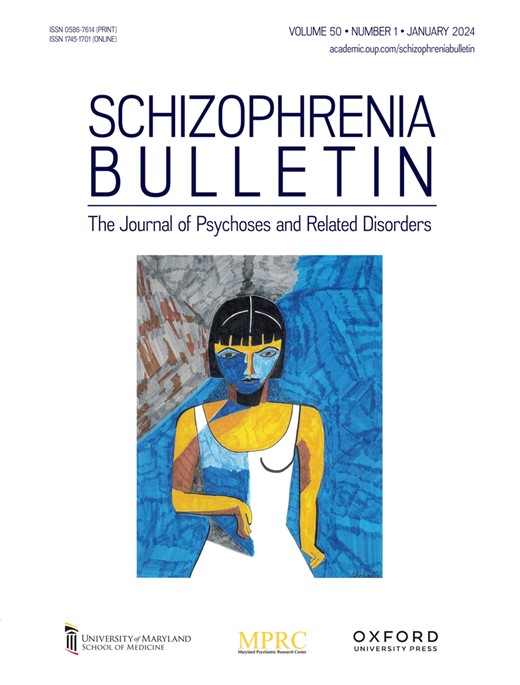在精神分裂症MK-801模型中,腹部超声刺激通过调节血清素信号和肠道微生物群缓解阴性症状
IF 4.8
1区 医学
Q1 PSYCHIATRY
引用次数: 0
摘要
背景与假设 腹部低强度脉冲超声(LIPUS)刺激通过抑制结肠中的炎症反应,有望成为一种新型的神经炎症治疗策略。本研究旨在评估腹部 LIPUS 是否能通过肠脑交流缓解 MK-801 诱导的精神分裂症样阴性症状。研究设计 每天用 LIPUS 或植物乳杆菌 PS128 对服用 MK-801 的大鼠进行为期 5 天的治疗,而另一组服用 MK-801 的大鼠则不接受任何治疗。在接受 LIPUS 或 PS128 治疗后,大鼠接受了行为测试、Western 印迹分析和组织学检查。通过 16S rRNA 测序分析检查肠道细菌组成的变化。研究结果 MK-801 会降低大鼠内侧前额叶皮层 (mPFC) 中 NMDAR1 和 VGAT 的表达,导致兴奋/抑制 (E/I) 比值失衡。它还降低了 5-HT1AR 和 5-HT2AR 的密度,导致多巴胺和血清素(5-HT)浓度降低。这诱发了前脉冲抑制、失乐症和社会退缩行为,并伴随着肠道微生物群多样性的减少。腹部 LIPUS 刺激有效减轻了 MK-801 诱导的肠道微生物群多样性减少,恢复了 NMDAR1、5-HT1AR 和 5-HT2AR 的密度,增强了多巴胺能神经元的活性,增加了 mPFC 中多巴胺和 5-HT 的释放,从而逆转了行为异常。结论 这些结果表明,腹腔 LIPUS 可通过调节血清素信号传导和肠道微生物群来缓解 MK-801 诱导的精神分裂症样阴性症状。本文章由计算机程序翻译,如有差异,请以英文原文为准。
Abdominal Ultrasound Stimulation Alleviates Negative Symptoms Through Modulation of Serotonin Signaling and Gut Microbiota in the MK-801 Model of Schizophrenia
Background and Hypothesis Abdominal low-intensity pulsed ultrasound (LIPUS) stimulation has potential as a novel therapeutic strategy against neuroinflammation via inhibition of inflammatory responses in the colon. This study aimed to evaluate whether abdominal LIPUS could alleviate MK-801-induced schizophrenia-like negative symptoms through gut–brain communication. Study Design Rats administered with MK-801 were treated daily for 5 days with either LIPUS or Lactobacillus plantarum PS128, while another group of MK-801-administered rats received no treatment. Following LIPUS or PS128 treatment, rats underwent behavioral testing, western blot analysis, and histological examination. Changes in the gut bacteria composition were examined through 16S rRNA sequencing analysis. Study Results MK-801 administration reduced NMDAR1 and VGAT expression in the medial prefrontal cortex (mPFC) of rats, leading to an imbalance in the excitation/inhibition (E/I) ratio. It also decreased 5-HT1AR and 5-HT2AR density, resulting in reduced concentrations of dopamine and serotonin (5-HT). This induced prepulse inhibition, anhedonia, and social withdrawal behaviors, accompanied by a reduction in gut microbiota diversity. Abdominal LIPUS stimulation effectively lessened the MK-801-induced reduction in gut microbiota diversity, restored NMDAR1, 5-HT1AR, and 5-HT2AR density, enhanced dopaminergic neuron activity, and increased dopamine and 5-HT release in the mPFC, thereby reversing behavioral abnormalities. Conclusions These results suggest that abdominal LIPUS alleviates MK-801-induced schizophrenia-like negative symptoms by modulating serotonin signaling and the gut microbiota.
求助全文
通过发布文献求助,成功后即可免费获取论文全文。
去求助
来源期刊

Schizophrenia Bulletin
医学-精神病学
CiteScore
11.40
自引率
6.10%
发文量
163
审稿时长
4-8 weeks
期刊介绍:
Schizophrenia Bulletin seeks to review recent developments and empirically based hypotheses regarding the etiology and treatment of schizophrenia. We view the field as broad and deep, and will publish new knowledge ranging from the molecular basis to social and cultural factors. We will give new emphasis to translational reports which simultaneously highlight basic neurobiological mechanisms and clinical manifestations. Some of the Bulletin content is invited as special features or manuscripts organized as a theme by special guest editors. Most pages of the Bulletin are devoted to unsolicited manuscripts of high quality that report original data or where we can provide a special venue for a major study or workshop report. Supplement issues are sometimes provided for manuscripts reporting from a recent conference.
 求助内容:
求助内容: 应助结果提醒方式:
应助结果提醒方式:


